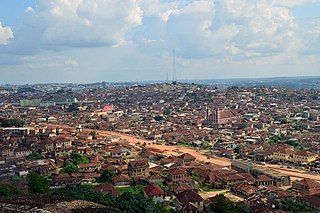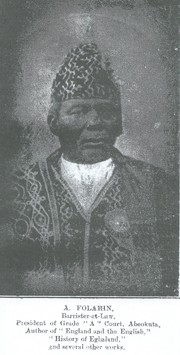This article needs additional citations for verification .(December 2020) |
Okukenu Sagbua (c. 1790-1862) was a Yoruba Egba chief. He was a founding member of the Ogboni of Egbaland, and also served as the first Alake of Egbaland.
This article needs additional citations for verification .(December 2020) |
Okukenu Sagbua (c. 1790-1862) was a Yoruba Egba chief. He was a founding member of the Ogboni of Egbaland, and also served as the first Alake of Egbaland.
Okùkẹ́nù was born sometime in the 1790s to Ọ̀ṣọ́ of Igbein in Egba Ake and Matiku, who was herself from Imo, a town that was also in Egba Ake. [1] His mother was a daughter of Adesomi, who was one of the daughters of Lukoye. Lukoye was a son of Laarun, an Alake of the Egba who ruled in the 18th century. [2] His mother was also related to Deliyi, an early figure in Abeokuta history, who was the Balogun of the town of Ijemo.
Upon the exodus of the Egba refugees to the comparative safety of Olumo Rock in Abeokuta in the aftermath of their homeland's destruction during the Yoruba Civil Wars, the traditional councils of chiefs - otherwise known as the Ogboni - that had formerly governed them were reconstituted. Okukenu was co-opted into the civil council during this exercise, and so his erstwhile title - Sagbua - was recognized as a civil one thereafter, even though it had originally been a military rank as an Eso Ikoyi title.
Following the death of the Egba paramount chief Shodeke in 1845, Okukenu and a brace of other powerful chiefs ruled Abeokuta jointly for a time. The rivalry that existed between them led to an anarchy that was only exacerbated by the slave trade, which was then at its peak.
After the death of the Losi of Ake (hitherto a favourite to succeed Shodeke), Okukenu was chosen and crowned on the 8th of August, 1854. Before his crowning, he unsuccessfully attempted to retrieve the head of the murdered Alake, Okikilu, who was the last paramount chief of the Egba people before the migration to Abeokuta. [3]
Following his coronation, he became the first Alake to rule in the fortified city of Abeokuta. As an ex-civil chief, he had the support of the civil chiefs during his reign, but was opposed by both the war chiefs and the trade chiefs, who had both profited from the state of anarchy. Okukenu managed to maintain order in his kingdom despite their efforts, though his authority wasn't great. [4] He was supported in this by Bashorun Apati, a former rival, who held office during his reign as the prime minister of Egbaland.
Okukenu died on August 31, 1862. During the subsequent interregnum, Bashorun Shomoye, a cousin of his, administered the kingdom. [5]
Okukenu had many wives and children. One of his wives, Efunwunmi, was originally a wife to another high chief - the Baase of Igbein - and had a son by him by the name of Arikuola. Upon seeing Efunwunmi, Okukenu decreed that she must be his wife, and forcefully took her as such. Okukenu and Efunwunmi's son, Gbadebo (who was born in June of 1854), later went on to become Gbadebo I, the Alake of Egbaland.
Okukenu's great-grandson, Adedotun Aremu Gbadebo III, is the current Alake of Egbaland. [6]
Omoba Sir Adetokunbo Adegboyega AdemolaSAN was a Nigerian jurist who was the Chief Justice of Nigeria from 1958 to 1972. He was appointed as Chief Justice on 1 April 1958, replacing Sir Stafford Foster Sutton who was retiring. Ademola was a son of Oba Sir Ladapo Ademola II, the Alake of the Egba clan of Nigeria. He was the first chancellor of the University of Benin.

Efunroye Tinubu, born Ẹfúnpọ̀róyè Ọ̀ṣuntinúbú, was a powerful Yoruba female aristocrat, merchant, and slave trader in pre-colonial and colonial Nigeria.

The Egba people are a subgroup of the Yoruba people, an ethnic group of western Nigeria, a majority of whom are from the central part of Ogun State that is Ogun Central Senatorial District.
Oba means ″ruler″ in the Yoruba and Bini languages. Kings in Yorubaland, a region which is in the modern republics of Benin, Nigeria and Togo, make use of it as a pre-nominal honorific. Examples of Yoruba bearers include Oba Ogunwusi of Ile-Ife, Oba Aladelusi of Akure, and Oba Akiolu of Lagos. An example of a Bini bearer is Oba Ewuare II of Benin.
Chief Suarau Olayiwola Alani Bankole is a Nigerian Egba businessman and chieftain from Ogun State. He was the Chairman of West African Aluminum Products Plc. He holds the Yoruba chieftaincy titles of the Oluwo of Iporo Ake and the Seriki Jagunmolu of Egbaland.

Abeokuta is the capital city of Ogun State in southwest Nigeria. It is situated on the east bank of the Ogun River, near a group of rocky outcrops in a wooded savanna; 77 kilometres (48 mi) north of Lagos by railway, or 130 kilometres (81 mi) by water. As of 2006, Abeokuta and the surrounding area had a population of 449,088.
Ijoko is a town in Sango /Ijoko Local Council Development Area of Ogun State, Western Nigeria, located north of Lagos and south of Abeokuta.
The Olowu of Owu is the paramount Yoruba king of Owu kingdom. The first Olowu of Owu is also one of the original kings in Yorubaland.
The Owu sub-ethnicity is a part of the Yoruba people of West Africa. Ago-Owu in Abeokuta is where the Owus are mostly concentrated, however large Owu settlements are found throughout Yorubaland. The Yoruba confederacy of kingdoms extends beyond the boundaries of Nigeria into the Republic of Benin and Togo.
Egba Ake, otherwise known as Egba Alake, is one of the five sections of Egbaland, the others being Oke-Ona, Gbagura, the Owu and Ibara. It is a traditional state which joins with its bordering sections to form something of a high kingship. The Alake of Abeokuta, or Alake of Egbaland, is the traditional ruler of the Egba clan of Yoruba in the city of Abeokuta in southwestern Nigeria.

Adedotun Aremu Gbadebo III is the current Alake of Egba, a clan in Abeokuta, Nigeria. He has ruled since 2 August 2005.

The Alake of Egbaland is the paramount Yoruba king of the Egba, a clan in Abeokuta, Ogun State, southwestern Nigeria. Egba consists of Egba Ake, Owu kingdom, Oke-Ona and Egba Gbagura.
Eso Ikoyi is an aristocratic attribute amongst the Yoruba people which denotes an eminent warrior. It has been used as everything from a chieftaincy title to a part of praise poetry.
Oba Sir Ladapo Samuel Ademola KBE, CMG (1872–1962), also known as Ademola II, was the Alake of Abeokuta from 1920 to 1962. Before he was crowned Alake, Ademola was involved in the affairs of the Egba United Government. As a member of the Egba council, he was a leading participant in negotiations with the Lagos State colonial government in 1889 for the rights to construct railway tracks passing through Egbaland. In 1904 he travelled with Alake Gbadebo to the U.K., where they were received by King Edward VII. He succeeded Oba Gbadebo in 1920 with overwhelming votes from the Egba council.
Samuel Adesina Gbadebo, otherwise known as Gbadebo II, was a Nigerian traditional monarch who held the title of Alake of Egbaland. Prior to becoming Alake, Gbadebo organized agricultural shows in the Western region of Nigeria.
Wasinmi or Wasimi is an Egba town located on the Lagos-Abeokuta Expressway in Ewekoro local government of Ogun State. It is a few miles from Abeokuta. It is home to one of the oldest churches in the area, St. Michael's Anglican Church, and home to Odegbami International College and Sports Academy.
Egba Gbagura is one of the five sections of Egbaland, the others being Ake, Oke-Ona, the Owu and Ibara. It is a traditional state which joins with its bordering sections to form something of a high kingship.

Chief Isaac Oluwole Delano was a Yoruba and Nigerian writer, educationist, political activist, nationalist, radio broadcaster, teacher, and a pioneering linguist and lexicographer of the Yoruba language.
Adegboyega Edun was an Egba official. He served as the secretary of the Egba United Government, a colonial-era Yoruba political entity.

Chief Adebesin Folarin was a Nigerian barrister, judge, public official, historian and author. He was one of the leading intellectuals in early 20th-century Abeokuta, and is recognised as "one of the first truly nationalist historians".